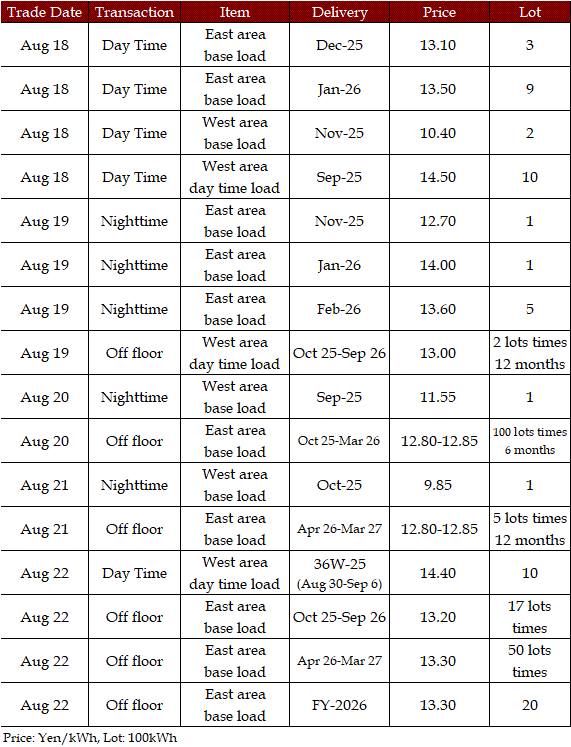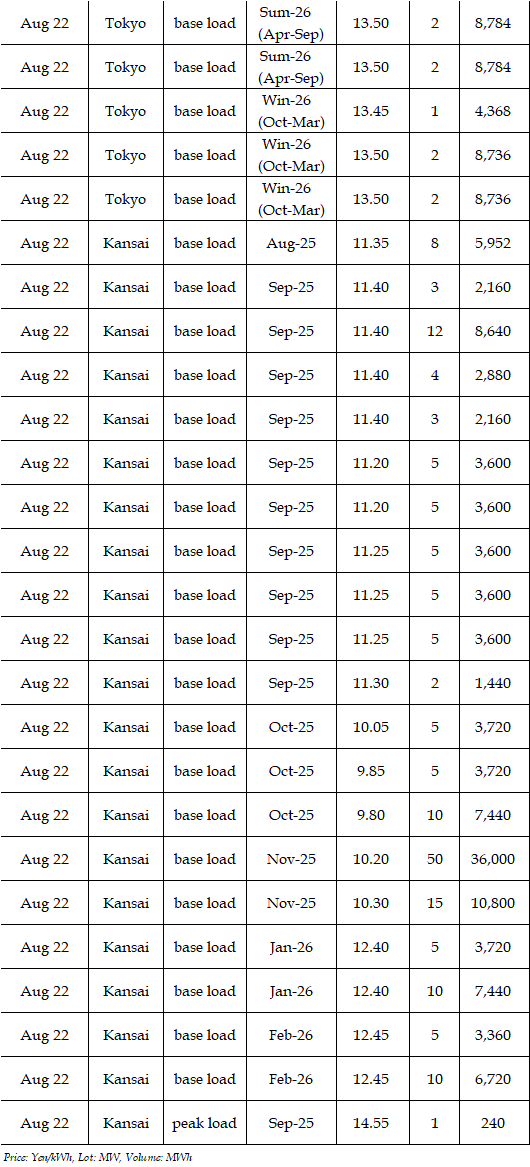Power: Aug 18-22: Spot prices rebound on increase in demand after Obon holiday
|
In the day-ahead market on JEPX (Japan Electric Power Exchange), the 24-hour spot power prices on a weekly average basis for Aug 18-22 delivery rebounded sharply from the previous week in East Japan (50Hz) as well as in West Japan (60Hz). Demand from industrial sectors returning to normal after the Obon holiday, along with scorching weather nationwide, raised prices. In Hokkaido, prices recorded the highest level in nine areas, such as posting Yen 50.00 at the beginning of the week, because the maintenance at the Hokkaido-Honshu Line starting Aug 18 lowered grid capacity and then brought a tight supply/demand balance. In other areas, prices did not hit an extraordinary high, with prices in Tokyo hovering at around Yen 13's and with those in Kansai & Chubu at around Yen 12's.
In Tokyo and Kansai, the key areas in East Japan and West Japan, the 24-hour average posted a difference in favor of Tokyo by Yen 1.00 for Aug 18, by Yen 1.20 for Aug 19, by Yen 1.52 for Aug 20, by Yen 1.99 for Aug 21, and by Yen 1.60 for Aug 22.
The fuel market trends in the fourth week of August were detailed as follows.
DES Northeast Asia spot LNG prices retreated slightly to low-$11's per mmBtu for prompt September 2025 delivery as of Aug 21, down about $0.25 from the end of the previous week (Aug 15). The softened natural gas markets in Europe as well as a reduced buying interest from end-users in Northeast Asia affected prices. The Ministry of Economy, Trade and Industry (METI) announced on Aug 20 that Japan's LNG inventories for power generation stood at 2.01 mil mt as of Aug 17, up 50,000 mt from a week before. The figure was below 1.70 mil mt at the end of August last year but below the average of the past five years at 2.04 mil mt.
FOB Newcastle thermal coal prices in Australia fell by $0.25 from the end of the previous week to the mid-$110s for August 2025 loading as of Aug 21. Prices followed weak gas prices.
In the crude oil market, WTI crude for October 2025 stood at mid- $63's per barrel as of the morning of August 22, while Brent crude for October 2025 was trading in the high-$67's. Prices went up by around $1.50 from the end of the previous week for WTI and by $2.00 for Brent. The uncertainty over the truce talks between Ukraine and Russia, along with a sharp decline in US crude inventory, pushed prices up.
The actual highest price during the week was at Yen 50.00 in Hokkaido on Aug 18; the actual lowest price during the week was at Yen 0.01 in Shikoku area from Aug 19 to 22.
By area, the weekly average of the 24-hour spot prices was at Yen 15.14 in Hokkaido, up Yen 4.25 from the previous week; Yen 13.07 in Tohoku, up Yen 2.90; Yen 13.74 in Tokyo, up Yen 3.40; Yen 13.48 in Chubu, up Yen 3.94; Yen 12.28 in Hokuriku and Kansai, up Yen 3.95; Yen 11.38 in Chugoku, up Yen 3.11; Yen 8.49 in Shikoku, up Yen 0.67; and Yen 11.27 in Kyushu, up Yen 3.02.
In the JEPX auction, the volume of offers was 1,275.83 mil kWh on a weekly average basis, down 15.0% from the previous week. Meanwhile, bids on a weekly average basis increased by 16.7% to 1,202.35 mil kWh. The weekly average of trade volumes recorded 900.22 mil kWh, up 10.1%.
Power demand in nine areas of Japan during Aug 18-22 was a combined 14,528.15 mil kWh, up 30.0% from 11,178.95 mil kWh during Aug 11-15. The figure was up 1.2% from the corresponding period a year earlier, which was 14,355.48 mil kWh during Aug 19-23, 2024 after day of week adjustment.
Deals reported on TOCOM (Tokyo Commodity Exchange) during Aug 18-22 were as below.
Deals reported on EEX (European Energy Exchange) during Aug 18-22 were as below.
For the final week in August, power spot prices were expected to move in the same range as the previous week. A spell of hot weather with around 35 degrees Celsius from Kanto through Kyushu would keep air conditioning demand robust, affecting prices. However, without large-scale troubles at power plants, the market might not see a spike in prices with ample offers exceeding bids. In the market, "Base load prices in the final week will hover at around Yen 14.00 in Tokyo; in Kansai, the prices will move Yen 1.00 lower than Tokyo" (a source at a power producer and supplier said).
|
||||||||||||||||||||||||||||||

















